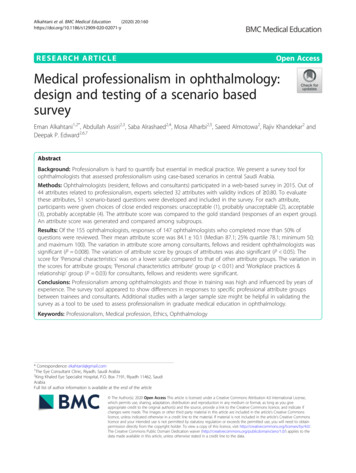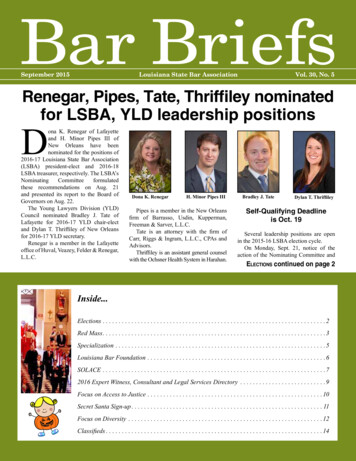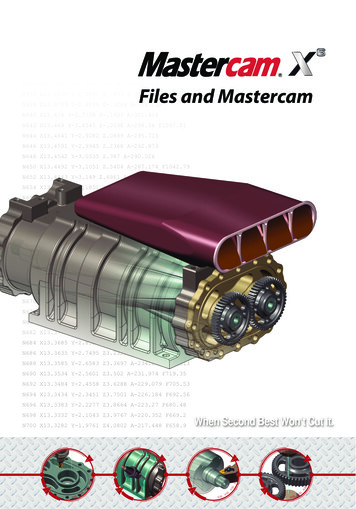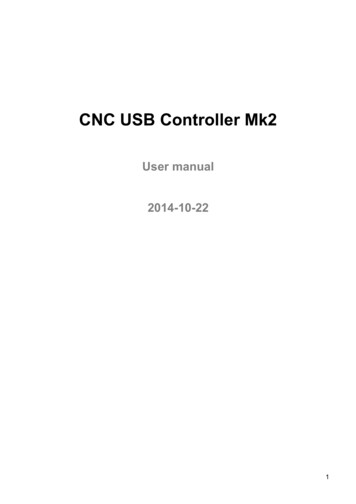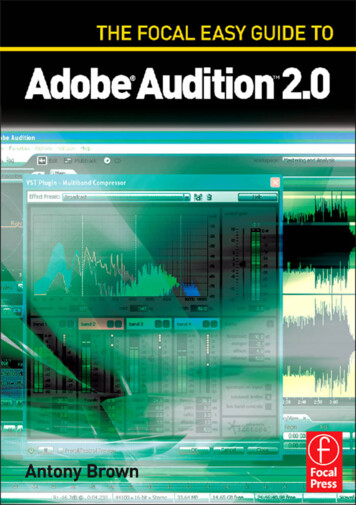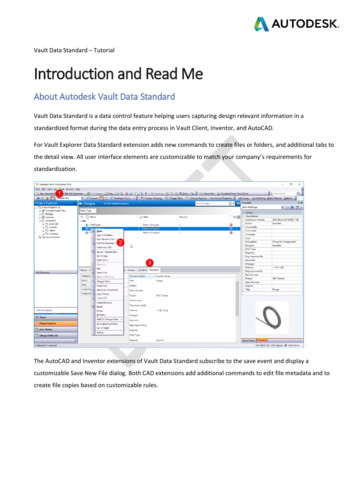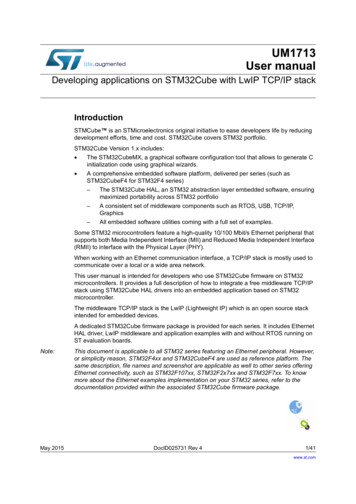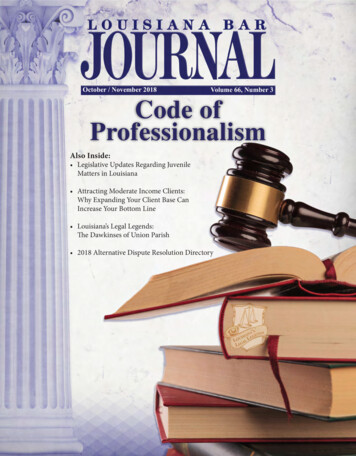
Transcription
Code ofProfessionalismAlso Inside: Legislative Updates Regarding JuvenileMatters in Louisiana Attracting Moderate Income Clients:Why Expanding Your Client Base CanIncrease Your Bottom Line Louisiana’s Legal Legends:The Dawkinses of Union Parish 2018 Alternative Dispute Resolution Directory
T heNe e d l eIn AHa y s t a c kComplex financial litigation cases often require the engagement of experts who can find “the needle in a haystack.”A substantial edge is gained when you have Legier & Company’s Forensic CPAs and Expert Witness Groupon your team to help you find obscured financial facts that build and prove stronger cases.Expert Testimony Fraud Forensic & Investigative Accounting Calculating and Refuting Financial DamagesBusiness Valuations Bankruptcies Shareholder Disputes Lost Profits Business InterruptionsLost Wages Corporate Veil Piercing Marital DissolutionsFor more information, contact William R. Legier (504) 599-83001100 Poydras Street 34th Floor Energy Centre New Orleans, LA 70163Telephone (504) 561-0020 Facsimile (504) 561-0023 http://www.legier.comSupplement to the Louisiana Bar Journal11
LAWPAY ISFIVE STAR!LawPay is easy, accurate, andso efficient - it has increasedour cash flow tremendously. Therecurring pay option for clientsis the best! Can’t beat the ratesand the website is easy to use!We love LawPay–it has reallyenhanced our firm!–Welts, White & Fontaine, P.C.Nashua, NHTrusted by more than 35,000 firms andverified ‘5-Star’ rating onInvoice PaymentPayment DetailWelts, White & Fontaine, P.C.29 Factory StreetNashua, New Hampshire03060Amount 500.00ReferenceCase 1234Thank youfor your promptpayment.THE #1 PAYMENT SOLUTIONFOR LAW FIRMSName on CardRoy SmithCard Numberearned/unearned fees are properly separated andyour IOLTA is always protected against third-party111PAY ATTORNEYand with LawPay, it is! However you run your firm,you. Designed specifically for the legal industry, yourCVV5555 5555 5555 5555Getting paid should be the easiest part of your job,LawPay's flexible, easy-to-use system can work forCard InformationLawPay is proud to be a vetted andapproved Member Benefit of theLouisiana State Bar Association.debiting. Give your firm, and your clients, the benefitof easy online payments with LawPay.Special offer forbar members.Call for details855-277-1913 or visitlawpay.com/louisianabarjournalLawPay is a registered ISO of Citizens Bank, N.A.Louisiana Bar Journal Vol. 66, No. 3169
Judy Perry Martinez2170October/ /NovemberNovember20182018October
October / November 2018Volume 66, Number 3DepartmentsFeaturesEditor’s Message. 174LSBA and Louisiana SupremeCourt Update Attorney Code ofProfessionalismBy Alicia M. Bendana.176President’s Message. 175Association Actions. 194Practice Management. 197Lawyers Assistance. 198Focus on Diversity. 200Puzzle. 202Focus on Professionalism. 204Discipline Reports. 206Recent Developments. 209Young Lawyers. 224La. Center for Law andCivic Education . 226Judicial Notes. 228People. 230Legislative Updates RegardingJuvenile Matters in LouisianaBy Katy Walker, Ph.D.180Modest Means OnlineLegal DirectoryAttracting Moderate Income Clients:Why Expanding Your Client BaseCan Increase Your Bottom LineBy Amy E. Duncan.184Louisiana’s Legal Legends:The Dawkinses of Union ParishBook Excerpt: A Family in theLouisiana Hill Country:The Dawkinses of Union ParishBy Beth Dawkins Bassett.188News. 232Classified. 238The Last Word. 240Also InsideWho’s Whoin ADR20172018LOUISIANA STATE BAR ASSOCIATIONANNUAL REPORTPostal Report. 173Member Services. 196Alcohol/Drug Abuse Hotline. 202Secret Santa. 210Advertisers’ Index. 220SOLACE. 228Supplement to the Louisiana Bar JournalSupplement to the Louisiana Bar JournalVolume 66, No. 3Louisiana Bar Journal Vol. 66, No. 3Who’s Who in ADR 20181Who’s Who in ADR 2018 Supplementmailed with this issue.Louisiana Bar Journal / 2017 Annual Report1LSBA Annual Report 2017 Supplementmailed with this issue.Louisiana Bar Journal Vol. 66, No. 3171
Officers 2018-19PresidentBarry H. Grodsky (504)599-8535President-ElectRobert A. Kutcher (504)830-3820SecretaryJohn E. McAuliffe, Jr. (504)840-4909TreasurerShayna L. Sonnier (337)436-1600Immediate Past PresidentDona Kay Renegar (337)234-5350Editorial BoardþþþþþBoard of Governors 2018-19First DistrictD. Skylar Rosenbloom (504)556-5507Darryl J. Foster (504)596-6304Second DistrictStephen I. Dwyer (504)838-9090Third DistrictShannon Seiler Dartez (337)233-1471Fourth DistrictJ. Lee Hoffoss, Jr. (337)433-2053Fifth DistrictEdward J. Walters, Jr. (225)236-3636Valerie Turner Schexnayder (504)813-3633Sixth DistrictEdward L. Tarpley, Jr. (318)487-1460Seventh DistrictPaul L. Hurd (318)323-3838Eighth DistrictPatrick J. Harrington (318)458-5839Chair, Young Lawyers DivisionDylan T. Thriffiley (504)842-4517At-Large MembersJermaine Guillory (225)389-8846Monique Y. Metoyer (318)729-1880Lynn Luker (504)669-0322LSU Paul M. Hebert Law CenterJohn M. Church (225)578-8701Tulane University Law SchoolRonald J. Scalise, Jr. (504)865-5958Louisiana State Law InstituteL. Kent Breard, Jr. (318)387-8000House of Delegates Liaison ChairSandra K. Cosby (504)452-7719Editorial StaffExecutive DirectorLoretta Larsen, CAECommunications DirectorKelly Wells PonderPublications Coordinator/Managing EditorDarlene M. LaBrancheCommunications Coordinator/Graphic DesignBarbara D. BaldwinCommunications AssistantKrystal Bellanger RodriguezAdvertising Booking Questions?Call (504)619-0131.172October / November 2018þþþþþþþþJohn E. McAuliffe, Jr.Editor(504)840-4909Christopher D. Cazenave(504)582-8408John S. (Chip) Coulter(225)362-2445Anthony M. DiLeo(504)274-0087Brendan P. Doherty(832)255-6019Stephen I. Dwyer(504)838-9090Laura S. Gravener(504)554-5807Mark A. Hill(504)581-1301Gerald J. (Jerry) Huffman, Jr.(504)957-9114Carrie L. Jones(225)346-1461Margaret E. Judice(337)828-1880Robert A. Kutcher(504)830-3820Winfield E. Little, Jr.(337)430-0907þþþþþþþþþþþþþþC. A. (Hap) Martin III(318)388-4700Alainna R. Mire(318)449-5046Claire McDaniel-Ojeh(225)622-2005John H. Musser V(504)523-0400Roy H. (Hal) Odom, Jr.(318)227-3762Maggie Trahan Simar(337)394-6133Kristine D. Smiley(225)298-0770Gail S. Stephenson(225)771-4900, ext. 216Scott L. Sternberg(504)324-2141Tyler G. Storms(318)255-7805Adrejia L. Boutte Swafford(504)561-5700Patrick A. Talley, Jr.(504)584-9220Edward J. Walters, Jr.(225)236-3636Jack K. Whitehead, Jr.(225)303-8600The Louisiana Bar Journal (ISSN 0459-8881) is published bimonthly bythe Louisiana State Bar Association, 601 St. Charles Avenue, New Orleans,Louisiana 70130. Periodicals postage paid at New Orleans, Louisiana andadditional offices. Annual subscription rate: members, 5, included in dues;nonmembers, 45 (domestic), 55 (foreign). Canada Agreement No. PM41450540. Return undeliverable Canadian addresses to: 4240 HarvesterRd #2, Burlington, ON L7L 0E8.Postmaster: Send change of address to: Louisiana Bar Journal, 601 St.Charles Avenue, New Orleans, Louisiana 70130.Subscriber Service: For the fastest service or questions, call Darlene M.LaBranche at (504)619-0112 or (800)421-5722, ext. 112.Editorial and Advertising:Publication of any advertisement shall not be considered an endorsementof the product or service involved. Submissions are welcome and will beconsidered for publication by the Editorial Board. For submission guidelines, go online at www.lsba.org, click on “Publications,” then “LouisianaBar Journal.” Copyright by Louisiana Bar Journal. All rights reserved.Reproduction in whole or part without permission is prohibited. Viewsexpressed are those of the authors only.Luminary Award 2003National Association of Bar ExecutivesCommunications SectionExcellence in Regular PublicationsInternationalAssociation ofBusinessCommunicatorsNew OrleansChapterBronze QuillAward of MeritPublic Relations Societyof AmericaNew Orleans ChapterAward of
NEW YORK, NEW YORKA MULTI-TOPIC CLE SEMINARNOV. 17-20, 2018INTERCONTINENTALNEW YORK TIMES SQUARE300 WEST 44TH STREETNEW YORK, NEW YORKThis program has been approved for 16.16 hours of CLE credit,including 3.16 hours of Ethics and 2 hours of Professionalism.Register Online:www.lsba.org/cleLouisiana Bar Journal Vol. 66, No. 3173
E D I T O R ’ SM E S S A G E40 Years (and Counting?)s this issue of the LouisianaBar Journal is distributed toour members, our very newest lawyers will be sworn inon Oct. 15. We congratulate all of themand welcome them to this practice of law.It was 40 years ago in October 1978 thatI and two of my best friends were swornin as new attorneys. I consider myselflucky to have attended law school withsuch close friends. However, we all tookdifferent paths after graduation.Jean Champagne, Leon Cannizzaroand I all graduated from De La Salle HighSchool. The three of us then attended andgraduated from the University of NewOrleans. Finally, we three graduated fromLoyola University Law School in 1978.At that point, we finally “separated”from each other — at least as far as ourdistinct careers.Jean began his career as a CPA-lawyerwith one of the “big eight” accountingfirms. Thereafter, he has been involvedwith several businesses and currentlyworks for a bank. He is well known inbusiness, banking and civic circles in St.Tammany Parish. (Yes, he moved awayto that faraway land on the north shoreof Lake Pontchartrain.)Leon began his career as an assistantdistrict attorney in Orleans Parish andthen had a short stint as a criminal defenseattorney. After that came his politicalcareer as a trial court judge, an appellatecourt judge and finally as Orleans Parishdistrict attorney. He, of course, remainsin that office.My path was different from both of myfriends. I spent one year as an in-housecorporate attorney. I then left the corporateworld and became an insurance defenseattorney, where I am today.A174October / November 2018By John E.McAuliffe, Jr.Hold on to those good friends youmade in law school. They will continue to beimportant to you. They can be an unendingsource of counsel for you, and sometimes yournext position or opportunity can result fromyour [law school mates].The three of us have remained closefriends. We continue to meet for lunch.We continue to discuss our legal andnon-legal problems. We have attendedweddings for all of our respective children.Our wives are friends. We all miss eachother’s parents although we continue totell stories about them. (I think I do a fairlygood imitation of Jean’s father. No needto imitate Leon’s father. If you see Leon,you are seeing his Dad.)All of this leads to two important pointsfor our new attorneys.First, hold on to those good friends youmade in law school. They will continueto be important to you. They can be anunending source of counsel for you, andsometimes your next position or opportunity can result from your continuedassociations with your law school mates.Through the years, you will need adviceon issues unrelated to your particularfield of practice. You will find your lawschool friends may well have invaluableinformation and insight for you. Mostof all, your good friends are in the bestposition to tell you when YOU are wrongor should change something in your life.Second, there are many careers where alaw degree gives you a “foot in the door”and an advantage. You do not have to actually “practice” law. Business, accounting,banking and other industries have a needfor well-educated (i.e., law degree) andinnovative professionals. Keep your options open. Your first career track doesnot have to be your last. Again, those lawschool friends may be in the best positionto assist you in any career decisions.We salute our new admittees. Many ofyou, at times, exhibited a herculean effortin balancing your studies, family life,work and personal obligations. You andyour friends will now join our profession,and we hope your career is rewarding andgratifying as you push to YOUR 40 yearsof practice.
P R E S I D E N T ’ SM E S S A G E“Try It. You’ll Like It!”few years ago, my wife,daughter and I went to a seafood restaurant for dinner. Mydaughter, Caroline, had neverseen, much less eaten, a raw oyster andwas fascinated when a dozen of themwere delivered to me. As she kept staring,I asked if she wanted to try one. “Nope.”I asked again, same response. Finally, Iasked, “Why not?” She said, “Because Idon’t like them.” I replied, “How do youknow? You’ve never had one.” I gave a lotof reasons why she should try an oysterand, reluctantly, Caroline finally ate onewith a bit of cocktail sauce. Two bites,then she spit it out. “That’s fine,” I said,“at least you tried one.”A few minutes later, she asked if shecould try another one. This time the resultwas different. She liked it. She proceededto eat the last six I had on my plate.That dinner came to mind when I bumpedinto a well-known New Orleans attorneysome time ago. He had been disillusioned bya prior experience with the Bar. I asked himto become a mentor in the Transition IntoPractice Program. He said no. I asked whynot. He said he would not like it. We wentback and forth and then he said, “You’ve gotfive minutes to convince me.” Five minuteslater, he decided to become a mentor. Hewent through the mentor training, completedthe mentor program and went to the mentorreception. He admitted that, once he wasconvinced to try it, he liked it. Amazing!As long as I have been in Bar leadership, I have preached this — try something,anything, for the Bar. You will be amazed.Perhaps I am the Bar’s biggest cheerleader.That’s fine. But I wouldn’t do this if I didnot believe in our Bar. I am convinced nowmore than ever that many lawyers simplydon’t know just how terrific our Bar is andwhat it has to offer.AAt a recent meeting of the NationalConference of Bar Presidents, an affiliate of the American Bar Association, themoderator asked the group — more than100 people were in attendance — if anyonewas satisfied with his/her Bar. I lookedaround and no one had raised a hand. Iwhispered to Loretta Larsen, our ExecutiveDirector, that I was really happy. She said,“Raise your hand!” I did. Only one otherBar president did the same.I see significant problems in other states— unfriendly Legislatures controlling theBars, poor relationships between the Barsand the state courts, Bars being sued, theinability to get volunteers, turmoil in certaincourts. We have none of these problems.What we have is an energetic Bar withcountless volunteers and Loretta and ourfriends at the Bar who do an unbelievablejob. But there are far too many among ourapproximately 23,000 members — judgesand lawyers alike — who are simply afraidof sticking their toes in the water. Perhapsfear of the unknown — like eating an oysterfor the first time — is preventing too manyof our members from joining in.I understand. We’re all busy with jobsand families. Other interests take our time.There are only so many hours in a day.But, believe me, you’re missing out. Justlike my daughter, try one. Join a committeeor a section. Don’t just attend a CLE, butgive one. Become a mentor. Run for a seatin the House of Delegates. Volunteer for alaw school orientation program. Submit anarticle for the Louisiana Bar Journal.Attendthe LSBA’s Midyear Meeting or AnnualMeeting. Do one thing. That’s all I ask.Becoming engaged in Bar activities canbe outside the law, too. Let’s talk about yournon-legal interests. The Journal has featuredarticles on Anthony M. (Tony) DiLeo’spaintings and Judge Michael A. Pitman’sBy Barry H. Grodskyand Randy P. Roussel’s photography. Whatinterests do you have outside the practice?Let’s publish it.It’s so easy to get involved. Check outthe LSBA’s website and find something,anything, which interests you and just do it.For our young lawyers, the Young LawyersDivision has great programs, many focusedon access to justice. For more seasonedlawyers, get active in the Senior LawyersDivision. Each Division has much to offer,including a joint lunch and CLE programin Baton Rouge in February.Those who get involved see the meritsand gain from it. Often, once you are in,participation expands. But, almost withoutexception, those who complain the mostabout the Bar do the least for it. If you giveto the Bar, the Bar will give back to youmany times over.I have spoken personally to many lawyers who have become active; some havebecome very involved and others havedone one thing. But, frankly, that’s all I’masking. Do one thing — anything — forthe Bar. What’s stopping you? The simpleanswer is “you.” If I can convince just onemember to perform one Bar function, thenI’ve succeeded. But with my faith in the Bar,participating in its programs and activities,having witnessed the true camaraderie of ourmembers at Bar functions and seeing howmuch you get back just by giving a little, Iknow that if you try it, you really will like it.I also know that, as you give to the Bar,both the Bar and you will benefit. I can assure you of that. Give it a try and see whatthe Bar can offer. There’s no doubt that,when you bite into this oyster, you willfind your pearl.Louisiana Bar Journal Vol. 66, No. 3175
The legal profession is a learned calling. As such, lawyers shouldact with honesty and integrity and be mindful of our responsibility to the judicialsystem, the public, our colleagues, and the rule of law. We, as lawyers, should alwaysaspire to the highest ideals of our profession. My word is my bond. I willconduct myself with honesty, dignity, civility, courtesy and fairness and will not engage in anydemeaning or derogatory actions or commentary toward others. I will not knowingly make statements of fact or law that are untrue or misleading and I will clearlyidentify for other counsel changes I have made in documents submitted to me. I willbe punctual in my communication with clients, other counsel and the court. I will honor scheduledappearances and will cooperate with other counsel in all respects. I will allow counsel fair opportunity to respond and will grant reasonable requests for extensions of time. I will notabuse or misuse the law, its procedures or the participants in the judicial process. I will cooperate with counsel and the court to reduce the cost of litigation and will not file or oppose pleadings,conduct discovery or utilize any course of conduct for the purpose of undue delay or harassment of any othercounsel or party. I will not engage in personal attacks on other counsel or the court or use the threat of sanctions as alitigation tactic. I will support my profession’s efforts to enforce its disciplinary rules and will not make unfounded allegationsof unethical conduct about other counsel. I will work to protect and improve the image of the legal profession in the eyes of the public. I will endeavor to improve our system of justice. I will use technology, including social media, responsibly.should reflect the professionalism expected of me as a lawyer.My words and actions, no matter how conveyed, I will seek opportunities to be of service to the bench and bar and assist those who cannot afford legal help. I willbe supportive of new members in the profession. I will stay informed about changes in the law, communication, and technology which affect the practice of law.Following approval by the Louisiana State Bar Association House of Delegates and the Board of Governors atthe Midyear Meeting, and approval by the Supreme Court of Louisiana on Jan. 10, 1992, the Code of Professionalismwas adopted for the membership. This revised Code, a product of the LSBA Committee on the Profession, wasapproved by the LSBA HOD in January 2018 and approved by the LA Supreme Court in March 2018.176October / November 2018
LSBA and Louisiana SupremeCourt Update Attorney Codeof ProfessionalismBy Alicia M. BendanaThe Louisiana State Bar Association’s (LSBA) Professionalismand Quality of Life Committeebegan drafting Louisiana’s firstattorney Code of Professionalism1 in 1991.The LSBA’s House of Delegates and Boardof Governors approved the first Code at itsMidyear Meeting the following year, and,on Jan. 20, 1992, the Louisiana SupremeCourt adopted it.In 2017, the LSBA’s Committee on theProfession, under the leadership of current LSBA President Barry H. Grodsky,formed a subcommittee to revisit, updateand modernize the 26-year-old Code ofProfessionalism. At the outset, the subcommittee agreed it would not rewritethe Code and would style any additionsor changes to conform with the existinglanguage in the Code. The subcommittee conducted numerous meetings todiscuss current challenges to attorneys,the judicial system and the image of thelegal profession. After numerous drafts,the subcommittee agreed on a final draftof an amended Code. The LSBA’s Houseof Delegates and Board of Governors approved the proposed amended Code at theLSBA’s Midyear Meeting in January 2018and the Louisiana Supreme Court adoptedthe amended Code of Professionalism, aswritten, on April 11, 2018.The Code now, as before, representsaspirational goals for Louisiana attorneyswho seek to implement and maintainstandards of civility and professionalismthat exceed the minimum mandated by theLouisiana Rules of Professional Conduct.A “redline” of the LSBA’s new amendedCode of Professionalism is below. All newlanguage is underlined and any revised orupdated pledges are in italics.Code of ProfessionalismThe legal profession is a learned calling. As such, lawyers should act withhonesty and integrity and be mindful ofour responsibility to the judicial system,the public, our colleagues, and the rule oflaw. We, as lawyers, should always aspireto the highest ideals of our profession. My word is my bond. I will conduct myself with honesty,dignity, civility, courtesy and fairnessand will not engage in any demeaning orderogatory actions or commentary towardothers. I will not knowingly make statementsof fact or law that are untrue or misleading and I will clearly identify for othercounsel changes I have made in documentssubmitted to me. I will be punctual in my communication with clients, other counsel and thecourt. I will honor scheduled appearancesand will cooperate with other counsel inall respects. I will allow counsel fair opportunity to respond and will grant reasonablerequests for extensions of time. I will not abuse or misuse the law,its procedures or the participants in thejudicial process. I will cooperate with counsel and thecourt to reduce the cost of litigation andwill not file or oppose pleadings, conductdiscovery or utilize any course of conductfor the purpose of undue delay or harass-ment of any other counsel or party. I will not engage in personal attackson other counsel or the court or use thethreat of sanctions as a litigation tactic. I will support my profession’s effortsto enforce its disciplinary rules and will notmake unfounded allegations of unethicalconduct about other counsel. I will work to protect and improvethe image of the legal profession in theeyes of the public. I will endeavor to improve oursystem of justice. I will use technology, includingsocial media, responsibly. My words andactions, no matter how conveyed, shouldreflect the professionalism expected ofme as a lawyer. I will seek opportunities to be ofservice to the bench and bar and assistthose who cannot afford legal help. I will be supportive of new membersin the profession. I will stay informed about changesin the law, communication, and technologywhich affect the practice of law.In 1997, the Louisiana Supreme Courtamended its Rules for Continuing LegalEducation to require that every Louisianalawyer attend at least one hour of professionalism CLE each year. Attorneys havebeen taking professionalism courses onessentially the same professionalism topicsfor the past 20 years. The new amendedCode opens up a number of additionaltopics related to attorney professionalismwhich the Committee on the Professionhopes will inspire education, discussionand action. Some of the new changes tothe Code include the following.Louisiana Bar Journal Vol. 66, No. 3177
Preamble: The Lawis a ProfessionThe new preamble to the Code stressesthat the law is a profession and that “we,as lawyers, should always aspire to thehighest ideals of our profession.” Thepreamble identifies the core characteristicsof the professional attorney as honestyand integrity and stresses the professionalattorney’s responsibility to the judicialsystem, the public, colleagues and the ruleof law. The new Code encourages attorneysto promote and commit to civility in theirprofessional lives and to work to restoregreater civility to the profession.2Inclusive ThinkingThe new Code establishes an aspirational goal for lawyers to be mindful ofrefraining from actions or commentarythat would be considered demeaning orderogatory toward others. This conceptof inclusive thinking goes beyond theboundaries of anti-discrimination andhopes to inspire attorneys to consider andincorporate alternative perspectives, experiences, values, expectations and modes ofthought before speaking and taking action.CooperationThe Bar understands that attorneys mustbe zealous advocates for their clients, and,especially in high-stakes litigation, opportunities for cooperation do not alwayspresent themselves. Attorneys in adversarial situations should, however, challengethemselves to look for opportunities forcooperation, communication, compromise and search for creative solutions. A“scorched earth” approach in litigation andnegotiation can be counter-productive assuch an approach costs clients money andfrequently diverts attorneys’ time, energyand focus away from what, oftentimes,amounts to a smaller number of genuineand relevant disputed facts or issues. Likewise in transactional matters, adversarieswho are pushed too hard may refuse toagree to deal points “on principle” despitethe fact that such concessions may cost theparty nothing and create goodwill whichwill facilitate deal closing.3178October / November 2018Public Image of the LegalProfessionThe public’s perception of, and faithin, the legal profession is waning. There isa need to preserve the image of the legalprofession in the eyes of the public andto support programs and activities thateducate the public about the law and thelegal system. Attorneys should aspire toconduct themselves in a manner that willencourage trust of the legal profession bymembers of the public. Attorneys shouldalso be mindful of their obligation toenhance the image of the legal profession in all of their professional activitiesand be so guided in comments about thejudiciary, opposing counsel or the members of any other profession, and in themethods and contents of advertising andpublic communications.Improve System of JusticeAs a self-governing legal community,attorneys should always seek to improvethe law and to improve access to, and theadministration of, justice. The hope isthat the new Code will inspire Louisianaattorneys to work with judges and othermembers of the bar to strive to make thelegal system more accessible, affordableand responsive to all.Social MediaThe American Bar Association’s LegalTechnology Resource Center surveys individual attorneys’ and law firms’ use ofblogging and social media. The followingstatistics from the Center’s 2016 LegalTechnology Survey Report reveal a majority of attorneys and law firms now usesocial media for professional purposes:4 74 percent reported that their firmshave a presence on social media (only 26percent do not). 76 percent reported individually using social media for professional purposes(only 24 percent do not). 78 percent report that their firmsmaintain a presence on LinkedIn (only22 percent do not). More than 85 percent report thatthey individually maintain a presence onLinkedIn for professional use (less than15 percent do not).This was not the case 20 years ago. Thenew Code introduces the concept of eProfessionalism, defined as the application ofprofessionalism to an attorney’s Internetactivities. Beyond the firm website and useof LinkedIn (a professional networkingsocial media platform), attorneys are nowcommunicating for professional purposesthrough blogging, Facebook and Twitter. Because some of these social mediaplatforms were originally developed andused for personal communications, attorneys focused on professionalism shouldbe mindful about drawing a distinctionbetween private and public communications on such platforms as those lines arenot always clear.5Pro Bono and PublicServiceThe new Code recommends that attorneys seeking to deepen their commitmentto professionalism look for opportunitiesto provide pro bono services to those inneed. While there are many ways thatprivate citizens, including attorneys, canserve the public interest, only attorneyscan provide legal representation to theindigent. Notwithstanding the primarybenefits of assisting the poor and improving the system of justice, attorneys whodo pro bono work often report a numberof professional and personal benefitsincluding gaining additional experience, education, increased recognitionand personal satisfaction.6 Moreover,additional incentive exists for pro bonoservice in Louisiana. Currently, Louisianaattorneys must earn 12.5 hours of CLEcredit each year to maintain their lawlicenses. In March 2015, the LouisianaSupreme Court announced Rule XXX,Rule 3, Regulation 3.21 which went intoeffect May 1, 2015. The Rule states thatattorneys who provide pro bono legalrepresentation “shall receive one (
LawPay is a registered ISO of Citizens Bank, N.A. Louisiana Bar Journal Vol. 66, No. 3 169 LawPay is easy, accurate, and . of easy online payments with LawPay. THE #1 PAYMENT SOLUTION FOR LAW FIRMS . 729-1880 Lynn Luker (504)669-0322 LSU Paul M. Hebert Law Center John M. Church (225)578-8701 Tulane University Law School

